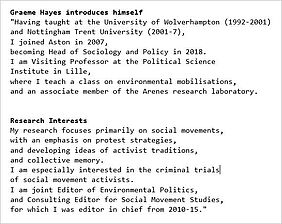Graeme Hayes - "Le répertoire d'action collective d'Extinction Rébellion en Grande-Bretagne"
Séminaire international Séminaire international
avec Graeme Hayes - Aston University, Birmingham - UK
L'exposé est en français, le résumé en anglais.
Lien Zoom : https://univ-lille-fr.zoom.us/j/97770522570
Intervenant :
Graeme Hayes : directeur du département de sociologie d'Aston University (Birmingham-UK),
Lien internet : ICI
----------
Discutant.e :
Mathilde Szuba, MCF en sciences politiques à Sciences Po Lille, chargée de recherche CNRS - Sociologie
Domaines de recherche : Antidiscrimination, politiques de la nationalité, racialisation, intersectionnalité, ethnographie, France, Allemagne
Lien internet : ICI
Résumé de l'exposé
In his account of the 2011 anti-austerity movements in southern Europe, Gerbaudo identifies the emergence of a popular discourse structured around the ‘re-establishment of the rights of individual citizens’ (2017, p.43). Gerbaudo defines this as citizenism. Citizenism is anti-oligarchic, challenging the concentrated power of political and economic elites; but it as an ‘under-power’ rather than a counter-power, as even as it seeks to resist, oppose and transform state institutions, it remains cognisant of its subjection to these institutions (p.48). In this paper, we argue that citizenism is a productive lens for understanding the political contours of Extinction Rebellion, an environmental movement which grew out of post-Occupy politics in the UK, whose central demands explicitly call for participatory democratic refoundation and whose dominant mode of activism privileges mass civil disobedience. We draw on two datasets: a survey with activists conducted during the first major ‘Rebellion’, in central London, in April 2019; and our ethnographic observation of court hearings of activists arrested for public order offences during this ‘Rebellion’, held in the City of Westminster magistrates court in late summer and early autumn 2019. We use the survey responses and court proceedings to establish a matrix of the beliefs and orientations to power of ‘ordinary’ XR activists. We argue that this matrix is characterised by (i) a high level of trust in social and political institutions; a belief in the nation state framework as the locus of political action; a critique of existing representative democratic institutions and forces as non-participatory; and a dominant discursive mode of address of ‘appeal to power’; (ii) a belief in individual responsibility, in individual political agency (the ‘citizen’ as material and not just abstract figure), and a commitment to post-ideological frameworks of analysis and action (science ‘blue dot’, intergenerational justice, consequentialist thinking); and (iii) an implicit exclusionary bias against those not enjoying citizenship rights.


